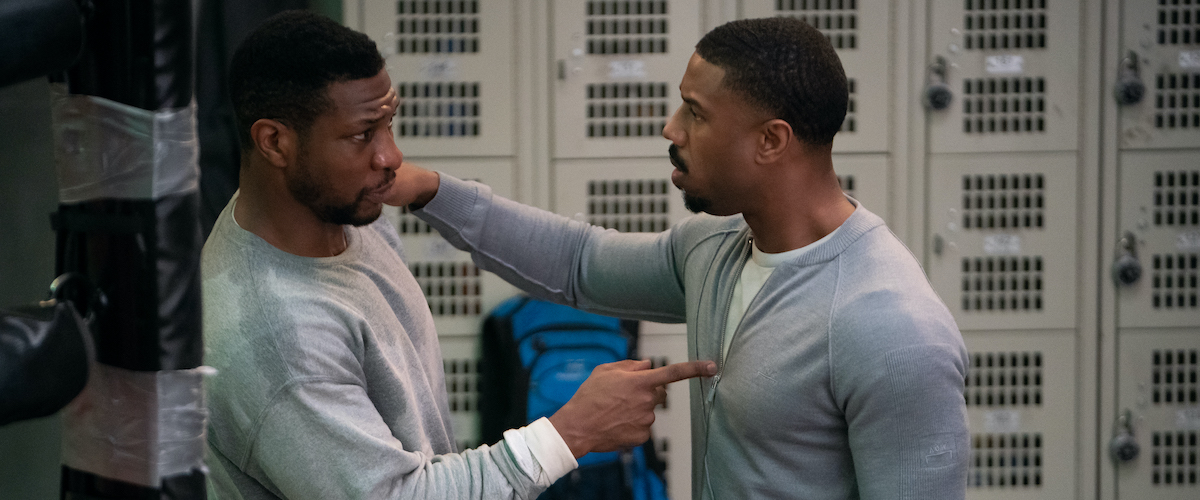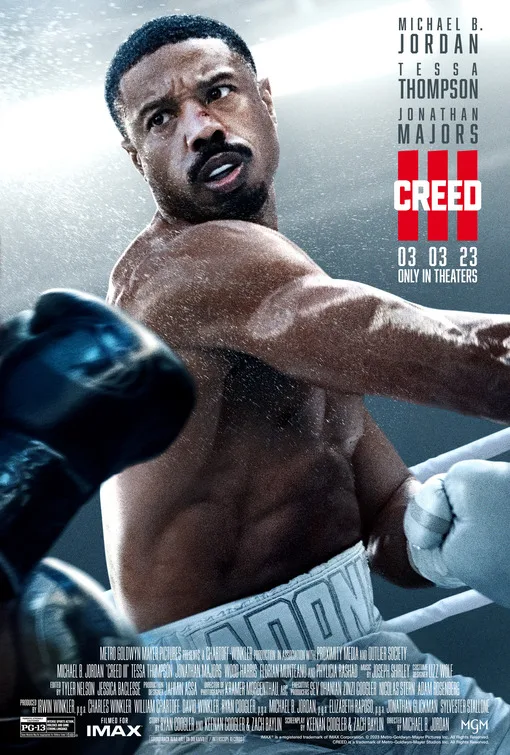The ambition alone is impressive.
For his directorial debut, Michael B. Jordan chose to take on “Creed III,” the latest film in the “Rocky” spinoff franchise and the ninth picture overall in the beloved boxing saga. He’s also directing himself in the process, as he returns once again to the titular role of champion fighter Adonis Creed, son of Apollo. And he’s electrifying on both sides of the camera, finding new swagger and emotional depth as the film’s star as well as real confidence and style as its director.
In doing so, Jordan is following in the footsteps of Sylvester Stallone, who directed himself in four of the “Rocky” movies, including 2006’s heartfelt “Rocky Balboa.” But he also has to follow the work of his longtime friend and close collaborator Ryan Coogler, who helmed the original “Creed.” Jordan has taken all that pressure and expectation and turned it into a film that both honors the series’ legacy while spinning the lore forward. And totally unsurprisingly, he draws powerhouse performances from his co-stars, including a fearsome Jonathan Majors as Adonis’ childhood friend-turned-adversary.
“Creed III” takes a little while to get going, though, as it flashes back to 2002 Los Angeles to establish the shared history between the film’s eventual competitors. We see Adonis “Donnie” Creed sneaking out of his bedroom as a young teenager to watch his big brother figure, Damian “Dame” Anderson, dominate in underground fights. A violent confrontation on the way home one night seals both of their fates, with Adonis going onto greatness and Damian heading for an 18-year prison term. A precisely timed, beautifully placed match cut moves the story ahead 15 years to show us that Donnie now has the boxing career Dame always dreamed of; another jump to the present day reveals that Adonis has retired from the ring and is living a luxurious life in a modern mansion in the Hollywood Hills.
Jordan’s eye for detail is on display as he efficiently reflects the kind of wealth Adonis enjoys with his wife, Bianca (Tessa Thompson), and their deaf daughter, Amara (Mila Davis-Kent). The minimalist elegance and creamy neutrals—the work of production designer Jahmin Assa and costume designer Lizz Wolf—instantly indicate the tasteful, peaceful persona Adonis now seeks to exude to the world.
Just as Adonis is shaping the next generation of fighters as a behind-the-scenes force at his own Delphi Boxing Academy, singer-songwriter Bianca is penning tunes and working with new talent as a producer. They tell themselves they’re content, but there’s an intriguing tension in the mix as it’s clear they both still long for the spotlight that once defined them, nourished them. Thompson brings an earthiness and sensitivity to this heavily masculine movie, and young Davis-Kent—who is a deaf actress—shines brightly in her first major role, more than holding her own opposite veteran performers with her sparky presence and timing. Phylicia Rashad also returns with a crucial, graceful performance as Adonis’ mother, Mary-Anne. And the frequent use of sign language as a means of communicating within the family is a meaningful, authentic touch.
But their reverie is shattered with the arrival of Dame, who has toughened himself in prison in every way and now seeks the boxing glory he believes is his due. There’s a certain geeky glee in witnessing the spectacle of Kang vs. Killmonger, given the significant villainous presence both actors have had within the Marvel Cinematic Universe. Majors, as always, is tremendous. He brings a deeply unsettling energy to the role—there’s something volatile about Dame beneath his seemingly placid exterior. The fact that he isn’t obviously raging all the time is what makes him scarier: He’s watching, plotting, seething, but his imposing physicality ultimately makes him ferocious.
Working with cinematographer Kramer Morgenthau and editors Jessica Baclesse and Tyler Nelson, Jordan the director takes a seemingly simple scene in which Adonis and Damian share an awkward reunion dinner and tells a full, rich story with it. The close-ups, the pacing, the decision to hold on an actor’s face for a beat or two longer than expected—they all convey so much meaning and subtext. The exchange is powerful for what it doesn’t show—for what these characters don’t tell us, for what they hold back strategically but we can sense, nonetheless.
But “Creed III” also gives the people what they want, and that is: multiple training montages. As they sing in “Team America: World Police,” “Even `Rocky’ had a montage.” Once it becomes clear that Donnie must get back into shape to fight Dame for the championship—at Dodger Stadium, of all places, a truly inspired location that’s so extremely L.A.—the screenplay from Keenan Coogler (Ryan’s brother) and Zach Baylin (“King Richard”) hits all the uplifting beats you’d expect, but tosses in some clever new ones, too. So yes, there’s running through the streets, on the beach, up a hill. There’s punching and sparring. But also: the sight of Adonis pulling an actual airplane through the sheer power of his pectorals. It’s kind of hilarious, but also wildly entertaining.
And when it comes time for the climactic showdown between these two warriors, Jordan makes some dazzling stylistic choices in terms of sound design, camera movements and visual effects. There’s a section where everything just … changes, providing an unexpected emotional resonance and a fresh perspective.
On the surface, “Creed III” may seem to be about hulking, muscular men beating the crap out of each other, and it exists within a genre where it’s often easy to discern between right and wrong, black and white. Adonis is all precision and control in the ring; Dame is rough and raw, fighting as if his life depends on it. But similar to Killmonger’s motivations in “Black Panther,” Dame’s quest for vengeance and even dominance is understandable. Watching these titans confront each other within that moral gray area—making themselves vulnerable in the process—is riveting.
Jordan has long since proven himself as an actor of terrific charisma, versatility and humanity; with “Creed III,” he shows he’s just as captivating on the other side of the lens.




















